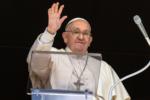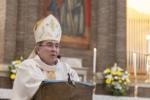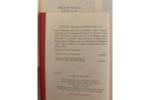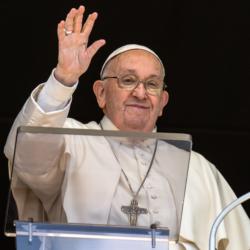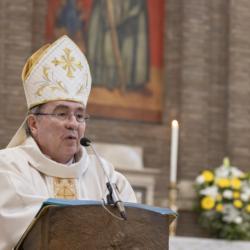Advent 2008: Journeying with Mary
In a Christmas refrain, St. John of the Cross wrote:
The Virgin weighed/ With the Word of God
Comes down the road/ If only you’ll shelter her.
In an arresting manner, he points out that if our hearts allow her space and love—if we “shelter” her as it were—she will truly lead us to Christ. We learn to absorb her redemptive attitudes. And during Advent—a season in which we are called to prepare to give birth to Christ in our hearts and in our world—we will, I believe, profit immeasurably by journeying with Mary.
One of the foundations of Mary’s spirituality was and is joy—a virtue so needed in our Church and our world. Some sociologists characterized the past century (20th) as a “sad century.” And so many observers of our contemporary scene conclude that the situation does not seem to have improved. In our quest for success, our spiritual instincts seem to have been sterilized.
We must never forget that joy is a constant in our spiritual tradition. Thomas Merton, in ‘‘Seeds of Contemplation’’ states simply and succinctly: “Do not look for rest in any pleasure, because you were not created for pleasures...you were created for spiritual joy.”
Moreover, Christ Himself, in His Last Will and Testament commanded us to be depositories of joy: “I have told you this that my joy may be in you and your joy may be complete” (Jn. 15,11).
Sometimes word-pictures can be helpful in elaborating a truth. In the case of joy, we might turn to John of the Cross’ image: “The Virgin weighed with the Word of God.” He leaves no doubt that the Word attached Himself to Mary. And redemptive reality remains constant. Our God is Emmanuel—God with us. In Baptism, He has given each of us His irrevocable promise that He will walk with us throughout our earthly pilgrimage.
On the Lord’s part, this attachment is a reminder of how much He loves each one of us. We are in His heart. And joy—humanly and spiritually—springs from the heart that loves. Through our dialogue of love with the Lord we slowly become transformed and journeying with Mary even externally we begin to radiate joy.
The fact that Jesus is our invisible companion on our earthly pilgrimage has so many ramifications. It means I can speak to Him, and in times of difficulty, I can rely upon His strength and support.
Mary’s prayer—the Magnificat—is also a prayer of memory. She not only notes the “great things” God has done for her on a personal level but also His faithfulness to His people Israel. In our own life, we should also be trying to cultivate a type of prayer of memory—learning to decode times of God’s faithfulness to ourselves, especially in helping us to get through difficult moments. This has always been a staple in the spirituality of God’s people. Thus the Psalmist could cry:
‘‘When my soul is downcast, I remember...’’
One of the handmaids of joy is the virtue of contentment—a virtue which seems to have slipped through the cracks in our anxious age. The present Holy Father wrote:
‘‘Each one of us
Is a result of a thought of God.
Each one of us is willed.
Each one of us is loved.
Each one of us is necessary.’’
In the Pontiff’s mind, each one of us is called upon to contribute to the building up of the Kingdom of God in our world (a kingdom of justice, love and peace) and in our own hearts. Such, of course, is a life-long process. In decoding the direction God wishes us to take in our lives, we should go to Mary, the “Seat of Wisdom” and ask her to aid and assist us in our search.
Finally, before we leave this reflection, we return to the image of Mary as the Woman of the Word. She not only heard God’s word but nourished it within. As we begin Advent, we should pray for the grace to realize that we are called to the same vocation. We must take time (that most overlooked of God’s blessings) to nourish the Word within ourselves. Like Mary, we must reflect upon God’s words (both in Scripture and through life’s events) in our hearts.
Msgr. McDonnell is a senior priest of the archdiocese and is in residence at St. Mary, Dedham.

